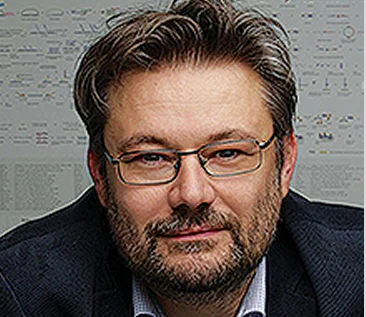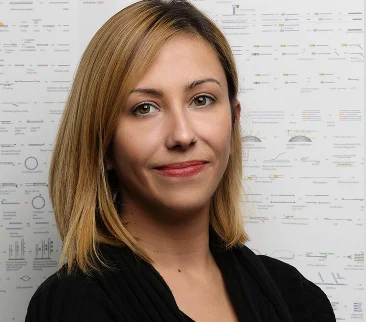The Bioinformatics group is located in the Division of Molecular Biology, Department of Biology, Faculty of Science at the University of Zagreb, Croatia. The group was formed in 2002 in an effort to include bioinformatics and computational biology courses in the molecular biology curriculum and to motivate students for research in this prominent and highly interesting new field of biology.
With a strong focus on education and collaboration, we support knowledge exchange through workshops, publications, and open-access tools.

Group leader and Full Professor of Bioinformatics at the Faculty of Science, University of Zagreb

Associate Professor of Bioinformatics at the Faculty of Science, University of Zagreb

While studying molecular biology at the University of Zagreb he developed a strong interest in applying computational methods and approaches to biosciences. For his master thesis he worked on a problem in X-ray crystallography and developed a program for absorption correction of scattered X-ray data. He obtained his PhD in Bioinformatics/Biochemistry, still pursuing his structural biology interests, working on a computational prediction of structural and physicochemical properties of DNA. He spent 10 years as a research fellow at the International Center for Genetic Engineering and Biotechnology in Trieste, Italy, where he also worked on computational prediction and classification of protein domains using machine learning approaches.
In 2002 he established a computational biology group at the Zagreb University, where he moved permanently in 2006 with the EMBO Young Investigators Programme installation grant, and directed the scientific interests towards the newly emerging field of genomics. His bioinformatics group develops computational tools and uses machine learning techniques to tackle open questions in developmental genomics and metagenomics.
In 2011 he became full professor at the Faculty of Science at Zagreb University. He had several international appointments, including a 4-year adjunct professorship at the University of Oslo, Norway and a two-year adjunct professorship at the University of Skövde, Sweden. From 2008 to 2012 he served as the head of the Division of Biology, Faculty of Science at University of Zagreb and was responsible for managing a division of ~150 staff.
He is involved in teaching four graduate-level courses: Bioinformatics, Algorithms and programming, Statistics and machine learning and Computational genomics. During his time as a group leader more than 30 doctoral and master students graduated under his supervision. Some of his graduates continued with PhD and postdoctoral training at prestigious universities around the world, including LMB Cambridge, UK; EMBL, Heidelberg, Germany; RIKEN, Japan and ETH, Zurich, Switzerland.
His scientific track-record includes more than 60 publications in high-level journals and talks in many renowned institutions throughout the world. His research topics are: developmental and differentiation genomics, metagenomics, population genomics and glycomics, origins of multicellularity, epigenomics of cancer, development of computational methods and application of machine learning in genomics and molecular biology.
He is the reviewer in a number of scientific journals, as well as national and international funding bodies and programmes, such as ESF Programme, EC FP7, H2020, and Horizon Europe Programmes, Estonian National Funding Agency, Hungarian National Funding Agency, Flanders Research Foundation, The Netherlands ZonMw Vidi Programme, Croatian National Funding Agencies. He reviewed program applications for Croatian pre-accession and accession structural funds.
Prof. Vlahoviček is a Fellow of the Academia Europaea, and a member of several professional societies, at the national and international level. Professor Vlahoviček is a strong proponent of science reforms in Croatia and evidence-based policy making. He served in the steering committee of Croatia’s highly successful science funding body, the Unity through Knowledge Fund (UKF) and has participated in several strategy-drafting panels at the university and national level. He also served as the Member of the Steering Committee of the Ruđer Bošković Institute, a leading Croatian research entity in natural sciences, with ~900 staff.
After obtaining a Diploma in Molecular Biology at the University of Zagreb, Rosa completed her PhD training in Bioinformatics at the Max Planck Institute for Molecular Genetics, Berlin and is now an Associate Professor of Bioinformatics at the University of Zagreb, Croatia. Her expertise is in relating genetic and epigenetic mechanisms to transcriptional regulation, regulatory elements and the development of complex diseases. Her research focuses on the application of statistical and machine learning methods for the analysis of multi-omics data, and has particular expertise in advanced subtyping analyses, primarily in the field of cancer genomics.
Rosa has an excellent record of publication of bioinformatics research in high-impact journals, including first-authored publications in esteemed journals including Nature (cited >600 times) and PNAS (cited >900 times). The quality of her work has been recognised by numerous prestigious honours including the L’Oreal UNESCO For Women In Science Award in 2011 and the National Science Award from the Croatian Ministry of Science and Education in 2016. She is a member of numerous current and past international collaborations such as Roadmap Epigenomics, Pan Cancer Analysis of Whole Genomes (PCAWG) consortium and International Cancer Genome Consortium – Accelerating Research in Genomic Oncology (ICGC-ARGO) consortium.
She is involved in teaching seven courses in the graduate program of Molecular Biology (Algorithms and programming, Machine learning and statistics, Computational genomics, Translational genomics, Experimental design of high-throughput experiments, Methodology of scientific research in biology, Data analysis in biological research), as well as a post-graduate course in Biostatistics. She was the project leader of the PROMISE Erasmus+ project at the Faculty of Science, within which an innovative online teaching program in the field of P4 medicine was developed. She actively participates in science popularization programs through numerous guest appearances in the media, participation in panels and holding popular lectures.
Paula has been an assistant in the Bioinformatics group since 2020. She holds a PhD in Biology and a Master’s degree in Molecular Biology from the Faculty of Science, University of Zagreb. Throughout her studies, she received numerous awards, including the Rector’s Award as a Master’s student and multiple best abstract and poster awards at various conferences.
Her research focuses on the analysis of complex diseases, particularly cancer genomics, utilizing high-throughput genomic data (whole genome, whole exome, and single-cell sequencing) and advanced machine learning methods. Paula is highly experienced across diverse areas of bioinformatics, including transcriptomics, cancer genomics, metagenomics, and the integration of machine learning techniques within these fields.
She contributes to teaching several graduate courses, including Algorithms and programming, Machine learning and statistics, Computational genomics, Translational genomics, and Experimental design of high-throughput experiments. In addition, she has co-mentored three Master’s theses and supervised multiple laboratory practices at the Faculty of Science.
In addition to her academic and research pursuits, Paula is engaged in science popularization. She participates in events like Znanost u prolazu, leads workshops at multiple conferences, and mentors high school students in their research projects as a part of collaboration with the Faculty of Science.
Doris is a PhD student in the Bioinformatics group, where she has been studying genetic factors associated with the severity of COVID-19 symptoms in Croatian patients since June 2022. She holds a Master’s degree in Molecular Biology from the Faculty of Science, University of Zagreb, where her thesis focused on phylogenetics of `Candidatus Phytoplasma` bacteria. During her student days, she gained valuable research experience through internships at the Croatian Institute for Brain Research, Ruđer Bošković Institute in Zagreb, and the Institute of Clinical Molecular Biology in Kiel, Germany.
She has expertise in data analysis and the application of statistical and machine learning methods in genomics, working with whole-genome sequencing, whole-exome sequencing, RNA sequencing, and single-cell sequencing data. She is also involved in teaching as an assistant for four graduate-level courses: Bioinformatics, Algorithms and Programming, Translational Genomics, and Experimental Design of High-Throughput Experiments. In addition to her academic pursuits, she is actively engaged in science outreach, serving as coordinator for the Biology Department’s participation in the annual “Day and Night at the Faculty of Science” event in 2024 and 2025.